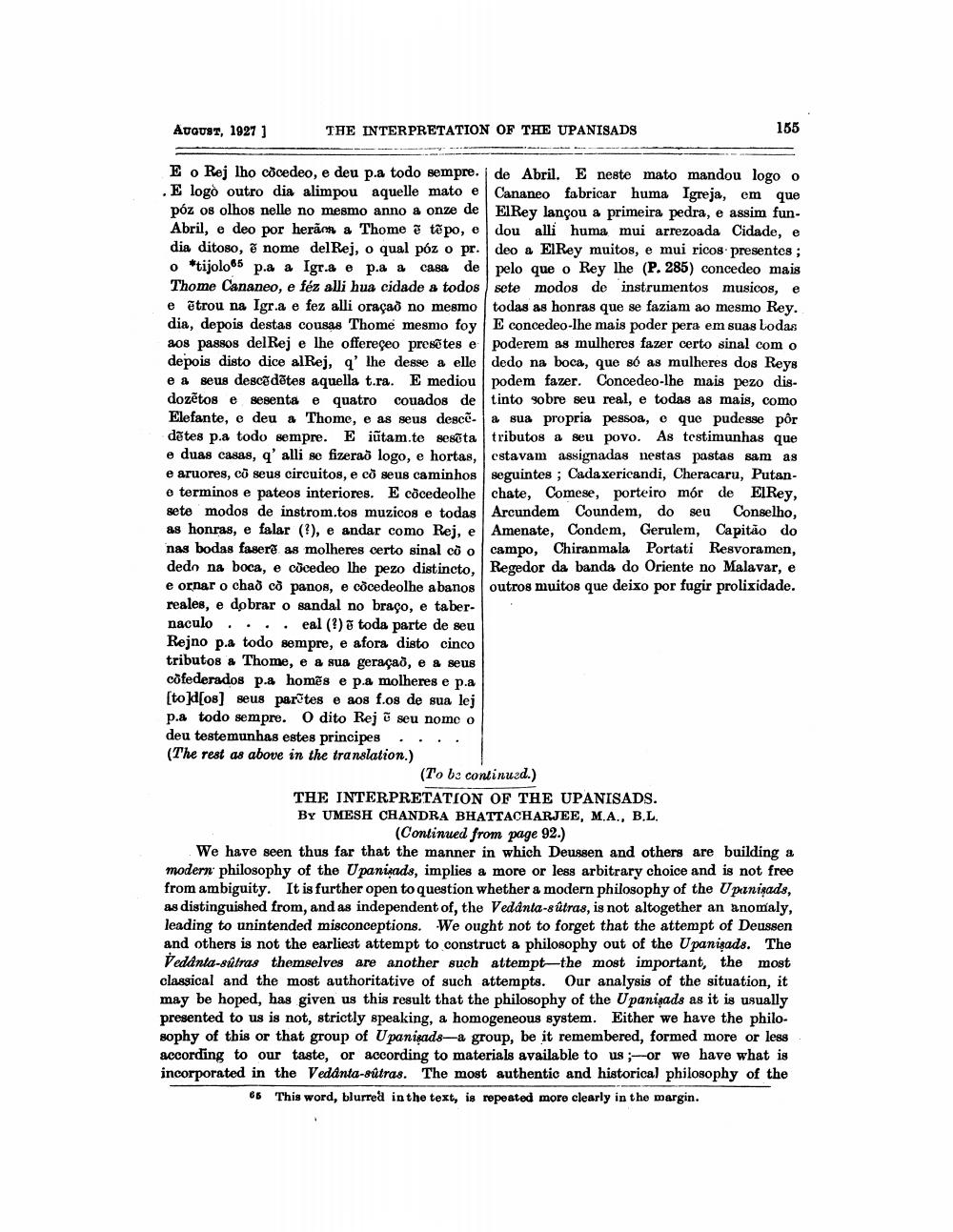________________
AUGUST, 1927 ]
E o Rej lho cöcedeo, e deu p.a todo sempre. . E logò outro dia alimpou aquelle mato e póz os olhos nelle no mesmo anno a onze de Abril, e deo por herão a Thome e tepo, e dia ditoso, e nome delRej, o qual póz o pr. o tijolo 5 p.a a Igr.a e p.a a casa de Thome Cananeo, e féz alli hua cidade a todos e trou na Igr.a e fez alli oraçao no mesmo dia, depois destas cousas Thome mesmo foy aos passos del Rej e lhe offereçeo presetes e depois disto dice alRej, q' lhe desse a elle e a seus descedêtes aquella t.ra. E mediou dozētos e sesenta e quatro couados de Elefante, e deu a Thome, e as seus desce dētes p.a todo sempre. E iutam.te seseta e duas casas, q' alli se fizeraò logo, e hortas, e aruores, co seus circuitos, e co seus caminhos e terminos e pateos interiores. E cöcedeolhe sete modos de instrom.tos muzicos e todas as honras, e falar (?), e andar como Rej, e nas bodas fasere as molheres certo sinal co o dedo na boca, e cocedeo lhe pezo distincto, e ornar o chao co panos, e cocedeolhe abanos reales, e dobrar o sandal no braço, e tabernaculo... eal (?) toda parte de seu Rejno pa todo sempre, e afora disto cinco tributos & Thome, e a sua geraçao, e a seus cofederados p.a homes e p.a molheres e p.a [to]d[os] seus partes e aos f.os de sua lej p.a todo sempre. O dito Rej & seu nome o deu testemunhas estes principes.
(The rest as above in the translation.)
THE INTERPRETATION OF THE UPANISADS
155
de Abril. E neste mato mandou logo o Cananeo fabricar huma Igreja, em que ElRey lançou a primeira pedra, e assim fundou alli huma mui arrezoada Cidade, e deo a ElRey muitos, e mui ricos presentes; pelo que o Rey lhe (P. 285) concedeo mais sete modos de instrumentos musicos, e todas as honras que se faziam ao mesmo Rey. E concedeo-lhe mais poder pera em suas Lodas poderem as mulheres fazer certo sinal com o dedo na boca, que só as mulheres dos Reys podem fazer. Concedeo-lhe mais pezo distinto sobre seu real, e todas as mais, como a sua propria pessoa, e que pudesse pôr tributos a seu povo. As testimunhas que estavam assignadas nestas pastas sam as seguintes ; Cadaxericandi, Cheracaru, Putanchate, Comese, porteiro mór de ElRey, Arcundem Coundem, do seu Conselho, Amenate, Condem, Gerulem, Capitão do campo, Chiranmala Portati Resvoramen, Regedor da banda do Oriente no Malavar, e outros muitos que deixo por fugir prolixidade.
(To be continued.)
THE INTERPRETATION OF THE UPANISADS. BY UMESH CHANDRA BHATTACHARJEE, M.A., B.L. (Continued from page 92.)
We have seen thus far that the manner in which Deussen and others are building a modern philosophy of the Upanisads, implies a more or less arbitrary choice and is not free from ambiguity. It is further open to question whether a modern philosophy of the Upanisads, as distinguished from, and as independent of, the Vedanta-sûtras, is not altogether an anomaly, leading to unintended misconceptions. We ought not to forget that the attempt of Deussen and others is not the earliest attempt to construct a philosophy out of the Upanisads. The Vedanta-sutras themselves are another such attempt the most important, the most classical and the most authoritative of such attempts. Our analysis of the situation, it may be hoped, has given us this result that the philosophy of the Upanisads as it is usually presented to us is not, strictly speaking, a homogeneous system. Either we have the philosophy of this or that group of Upanisads-a group, be it remembered, formed more or less according to our taste, or according to materials available to us;-or we have what is incorporated in the Vedanta-sûtras. The most authentic and historical philosophy of the
es This word, blurred in the text, is repeated more clearly in the margin.




